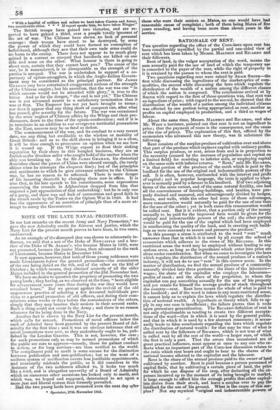NOTE ON THE LATE NAVAL• PROMOTION.
IN our last remarks on the recent Army and Navy Promotion,* we gave the new Admiralty credit for fairness and Justice, which the Navy List for the present month proves to have been, in two cases, undeserved.
. As an example of the disregard that was shown to aristocratic in- fluence, we said that a son of the Duke of NEWCASTLE and a bro- ther of the Duke of St. ALBAN'S, who became Mates in 1836, were not promoted, because the junior Mates, then advanced to the rank of Lieutenant, became Mates in December 1835.
It now appears, however, that both of those young noblemen were triode Lieutenants before the general promotion—the commission of the one being dated on the Stb, and of the other on the 23d of _October; by which means, they obtained seniority of all the older .Mates included in the general promotion of the 23d November last,
We have no desire to question the propriety of promoting the two young lords ; they having, as we observed at the time, " been eligible for advancement more years than during the war they would have remained hours." But we protest against the revival of the old ungenerous practice of selecting a few favoured individuals pre- vious to a general promotion of old officers, and dating their com- missions some weeks or days before the commissions of the others, simply that they may become their seniors in their several ranks. Such a thing could not occur in the Army ; and there is no reason .whatever for its being done in the Navy.
Another fact is shown by the Navy List for the present month, vihich calls for remark. Promotions of naval officers below the rank of Admiral have been gazetted by the present Board of Ad- miralty for the first time ; and it was an obvious inference that all naval promotions were now, as they undoubtedly ought to be, pub- lished in the London Gazette. This is not, however, the case ; for such promotions only as may be termed promotions of which the public are sure to approve—namely, those for gallant conduct in action, or for long services—are thus notified to the world. The compliment paid to merit is some excuse for the distinction between publication and non-publication; but as the want of a uniform system of notification covers less justifiable appointments, and necessarily misleads the public, as it did ourselves in the instance of the two noblemen alluded to, it looks too much like a trick, and is altogether unworthy of a Board of Admiralty which on numerous other occasions has looked only to merit, and which was, we hoped and supposed, determined to act upon a more just and liberal system than formerly prevailed. Had the two young lords been promoted even the next day after * Spectator, 27th November 1841.
those who were their seniors as Mates, no one would have had reasonable cause of complaint ; both of them being Mates of five years standing, and having been more than eleven years in the service.


























 Previous page
Previous page